32 F. high in the Twin Cities Sunday.
26 F. average high on February 5.
29 F. high on February 5, 2016.
February 6, 1994: The national low is at Tower, dropping down to -41.
The Weather Pattern is Deja Vu - All Over AgainLast
year the metro area saw a 219 day growing season. That's typical for
southern Oklahoma and northern Texas. Fishing boats were in the water
for 9 months. In Minnesota. A fluke? Perhaps.
But weather models are consistently pulling 40s and even a few 50s into Minnesota
within 2 weeks
with rain, even a few T-storms. Typical for early April. Will this be
another supernaturally early spring like 2012, when flowers were in
bloom by late March? I'm starting to wonder.
There's little doubt
this month will be the 18th month in a row of warmer than normal
temperatures statewide; unprecedented in the historical record,
according to the Minnesota DNR.
Weather whiplash is brewing this week: a thaw today, a couple sloppy inches of snow
Tuesday (heaviest bands stay north/east of MSP), then colder
Wednesday with a wind chill dipping to -10 F. Mild air comes roaring back
Friday with highs in the 40s to near 50F.
I
expect a more active year for tornadoes. 130 tornadoes touched down
last month, second most (and second deadliest) since 1950. I suspect
America's tornado drought is over.
Photo credit: Gooseberry Falls, Minnesota photo courtesy of AerisWeather meteorologist D.J. Kayser.
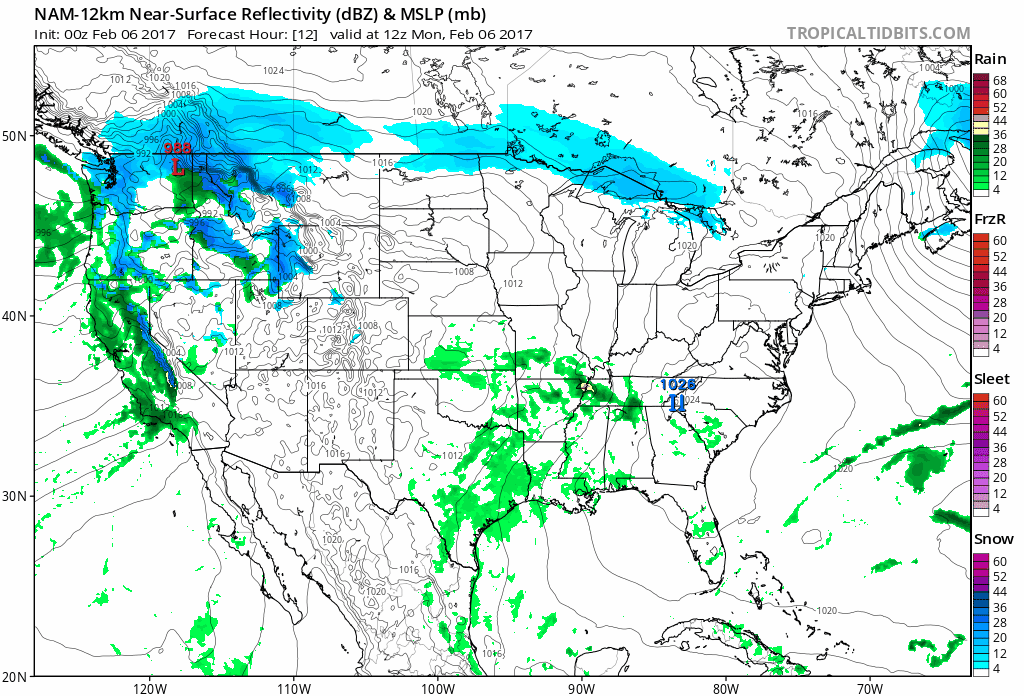 More March Than February.
More March Than February.
There's a lot of green (rain) showing up on the future radar/isobar
animation from NOAA's 12 KM NAM model, at least for the first week of
February. More storms push innto the west coast with ice and wet snow
mixing with the rain from Portland to Seattle; flooding rains possible
for the Bay Area. A little snow spreads across northern Minnesota and
Wisconsin ahead of a cold jab, but any numbing wind chill values will be
fleeting. Meanwhile rain showers spread across the Ohio Valley with a
freak rain for places like Cleveland and Buffalo by midweek. Winter is
on life support. Animation: Tropicaltidbits.com.
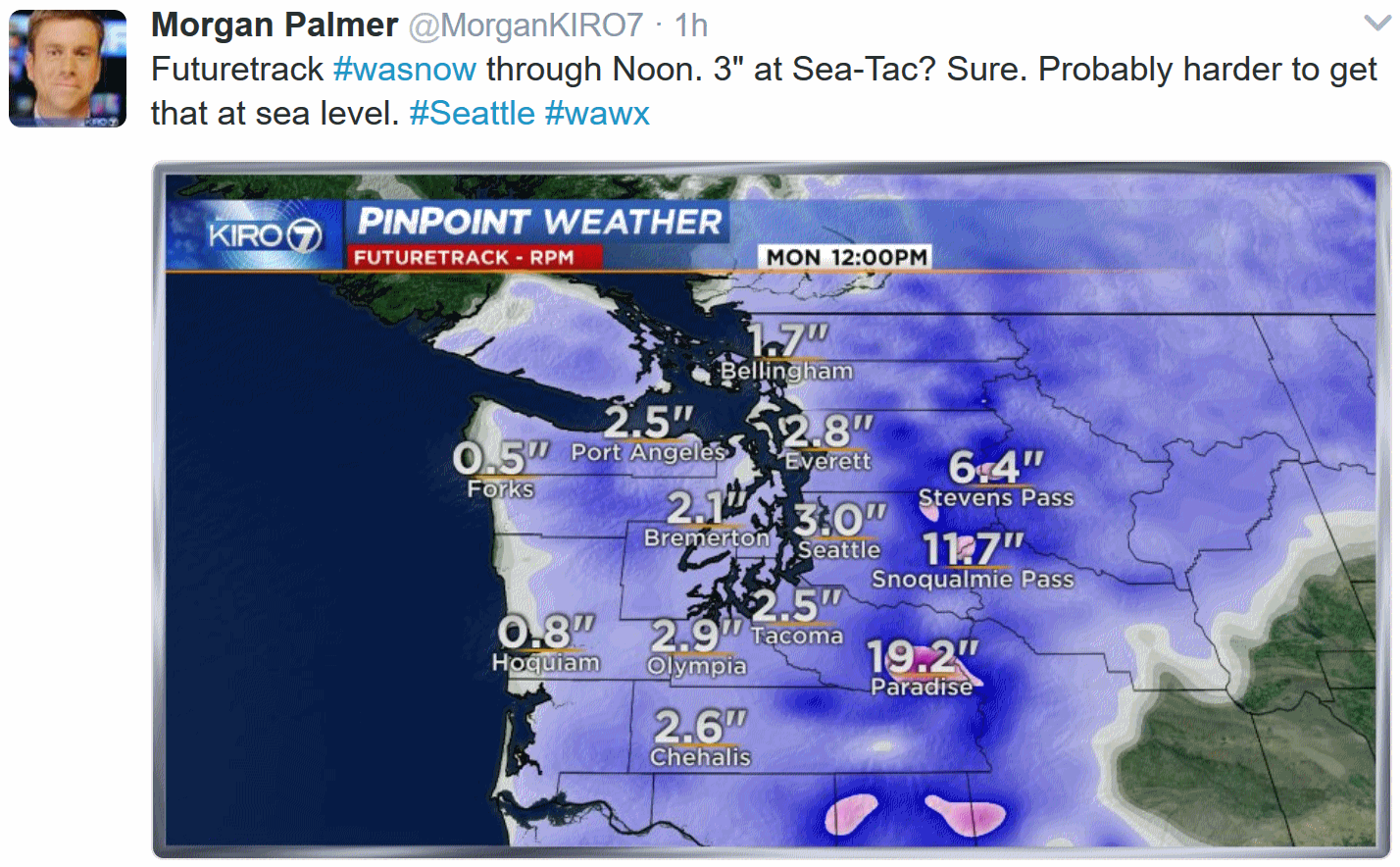 Plowable Snow Seattle Area?
Plowable Snow Seattle Area? A
few inches of snow is forecast to fall from Tacoma and Olympia into
Seattle in the coming days, enough to shovel and plow for many suburbs
as a series of storms sweep in from the Pacific.
March-uary?
Which sounds a lot like mortuary - which may be appropriate since
winter is being given last rights. ECMWF guidance shows a string of 30s
and 40s; a 50-degree high not out of the question by mid-February as
strong (mild) Pacific winds overwhelm the pattern across much of
America. Graphic: WeatherBell.
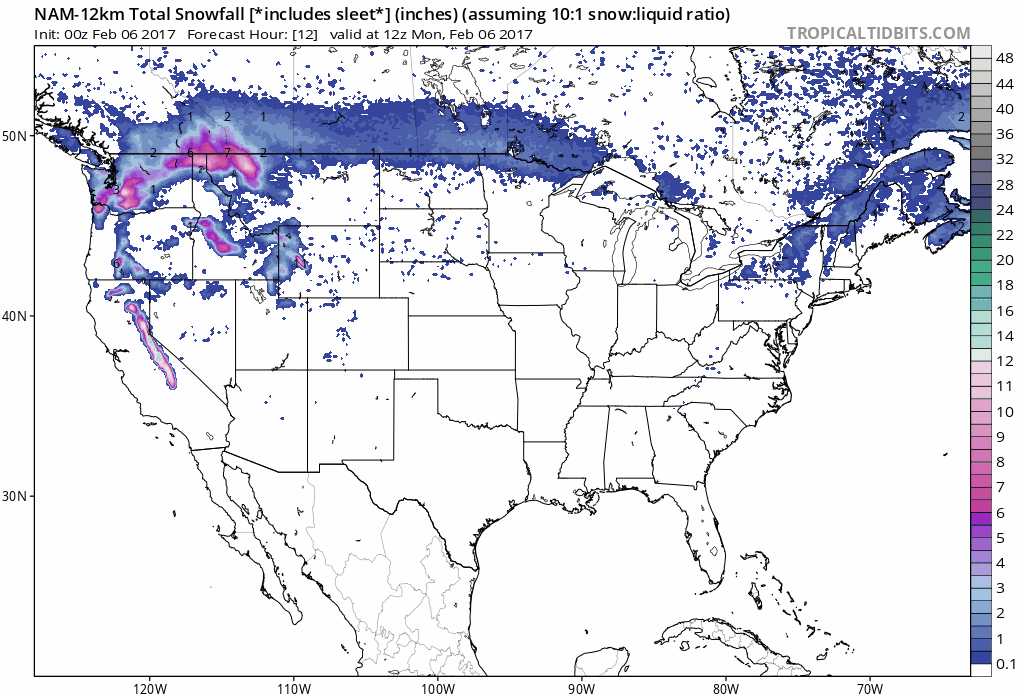 Snow Potential Fizzles Upper Midwest
Snow Potential Fizzles Upper Midwest.
Latest models aren't nearly as impressive for snowfall amounts from the
Twin Cities to Green Bay and Marquette; a period of ice and rain
helping to keep amounts down, and no deep layer of cold air or sustained
flow from the Gulf of Mexico capable of racking up significant amounts.
Over the next 84 hours the best chance of heavy snow comes across
interior New England and out west, from the Colorado Rockies to the
Cascade Range of Washington State.
Winter Begins to Sputter.
After a promising start in December winter has left much to be desired
for Minnesota snow lovers in recent weeks with an extended January Thaw
and a handful of rain events spoiling the fun. GFS guidance shows 40s,
even a few 50s within 2 weeks - a somewhat similar solution to the ECMWF
model. I'd expect to see temperatures like this the latter half of
March, but mid-February? Wow.
River Forecasters Keeping Watch Over the Red River. The Star Tribune reports on the potential for river flooding from Fargo and Moorhead to Grand Rapids this spring: "...
With
spring’s thaw only weeks away, communities along the Red River are
keeping a wary eye on the flood forecast. After a long dry stretch, the
region has been soaked with double the usual amount of winter rain,
sleet and snow, prompting the National Weather Service to recently issue
an early warning about potential spring floods.
The Red has flooded in 50 of the past 111 years, although in recent
springs, it has stayed largely within its banks, keeping flood-prone
communities from breaking out the sandbags. If that changes this spring,
Minnesota officials say they’re ready, after years spent shoring up
their flood defenses..."
File photo from Fargo in 2009. Image courtesy of Brian Petersen, Star Tribune.
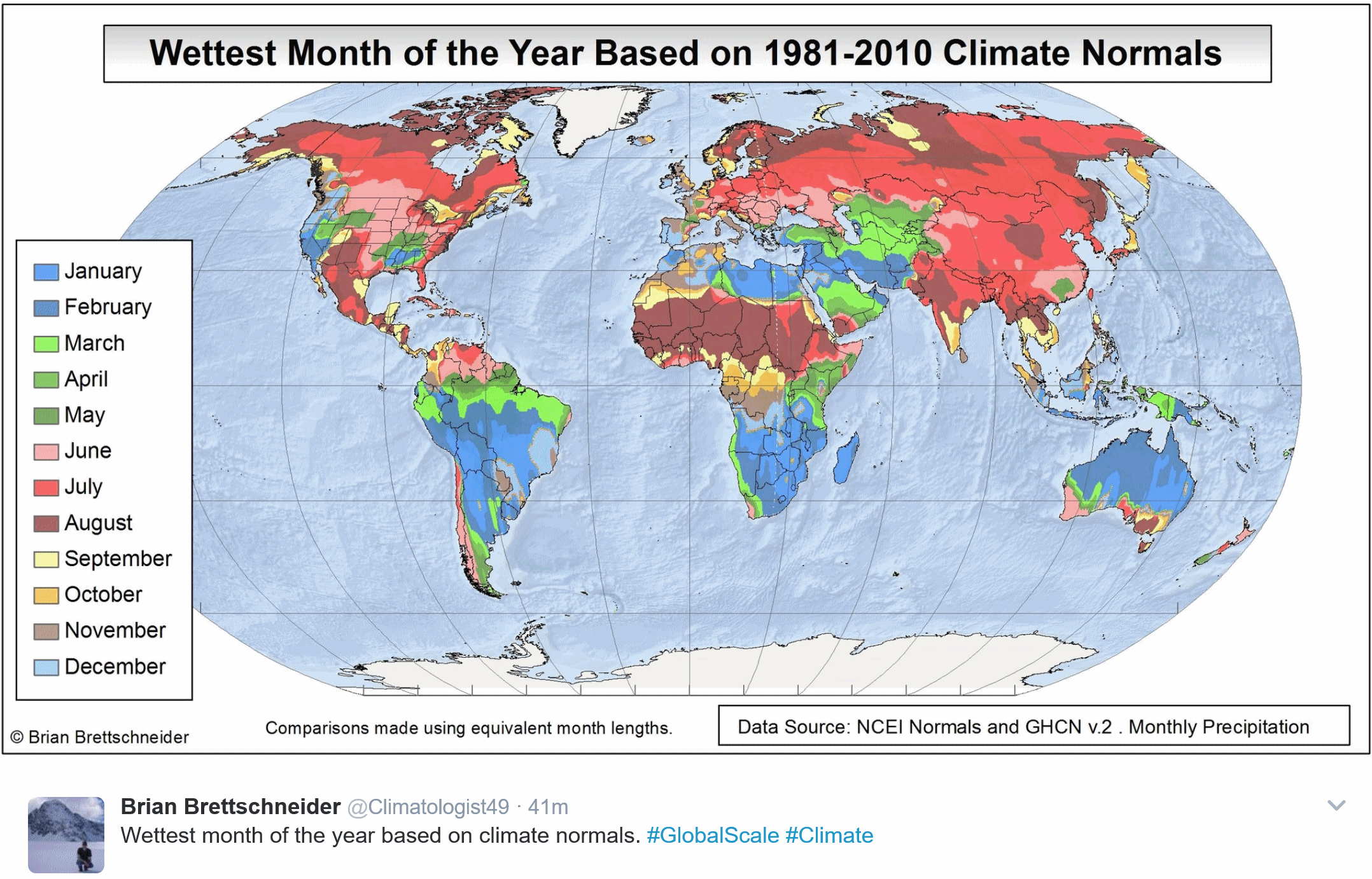
Football Goes Green. A few interesting nuggets at
Huffington Post: "...
The
trend towards sustainability isn’t just a postseason phenomenon. In
recent years, the NFL has become an unlikely champion of renewable
energy, teaming up with the Environmental Protection Agency, Natural
Resources Defense Council and other environmental organizations to
monitor its clean energy initiatives. In 2015, nearly one-third
of NFL teams played or trained at solar-equipped facilities, according
to the Solar Energy Industries Association. That figure includes a
couple ofstandouts,
like Gillette Stadium in Foxborough, Massachucets. The complex boasts
some 3,000 solar panels — enough to power office buildings and stadium
lights on days without a game. Philadelphia’s Lincoln Financial Field features 11,000 solar panels and 14 wind turbines, the most of any stadium..." (Photo credit: Lincoln Financial Field, DLR Group).
The Surprising Link Between Air Pollution and Alzheimer's Disease.
The Los Angeles Times reports: "
With
environmental regulations expected to come under heavy fire from the
Trump administration, new research offers powerful evidence of a link
between air pollution and dementia
risk. For older women, breathing air that is heavily polluted by
vehicle exhaust and other sources of fine particulates nearly doubles
the likelihood of developing dementia, finds a study
published Tuesday. And the cognitive effects of air pollution are
dramatically more pronounced in women who carry a genetic variant, known
as APOE-e4, which puts them at higher risk for developing Alzheimer’s
disease. In a nationwide study that tracked the cognitive health of
women between the ages of 65 and 79 for 10 years, those who had the
APOE-e4 variant were nearly three times more likely to develop dementia
if they were exposed to high levels of air pollution than APOE-e4
carriers who were not..."
How a Looming $100 Billion IPO Could Trigger Massive Paydays in Solar. Here's an excerpt from an interesting post at
TheStreet.com: "
When the world's largest petrostate decides to bet on clean energy, it's time to pay attention.
Saudi Aramco, Saudi Arabia's massive state-owned oil company, is
gearing up to sell a small stake to the public. Just 5% of this $2
trillion firm would equate to a $100 billion IPO, four times larger than
Alibaba's (BABA)
2015 IPO, which currently stands as the biggest new stock issue ever.
However, here's where things get even more interesting: Saudi Aramco has
telegraphed its long-term direction. The company has tasked a team of
global investment banks with lining up a portfolio of solar energy firms
primed for acquisition. According to Bloomberg,
$5 billion is available for this spending spree, which should help
Saudi Aramco meet its goal of generating 10 gigawatts of power from
renewable energy sources by 2023..."

 TODAY
TODAY: Cloudy and milder. Winds: SE 5-10. High: 37
MONDAY NIGHT: Light snow or mix late. Low: 29
TUESDAY: Turning colder, mix ends as a coating to 1" of slush. Winds: NW 10-15. High: 32
WEDNESDAY: Chilled sunshine, feels like 0 to -10F. Winds: NW 7-12. Wake-up: 6. High: 12
THURSDAY: Plenty of sun, temps. moderate. Winds: SW 10-15. Wake-up: 2. High: 26
FRIDAY: Windy, hints of spring in the air. Winds: SW 10-15. Wake-up: 23. High: 47
SATURDAY: Light rain or a mix. Winds: E 8-13. Wake-up: 31. High: 36
SUNDAY: Mostly cloudy, slightly cooler. Winds: NW 10-15. Wake-up: 23. High: 32
Climate Stories...
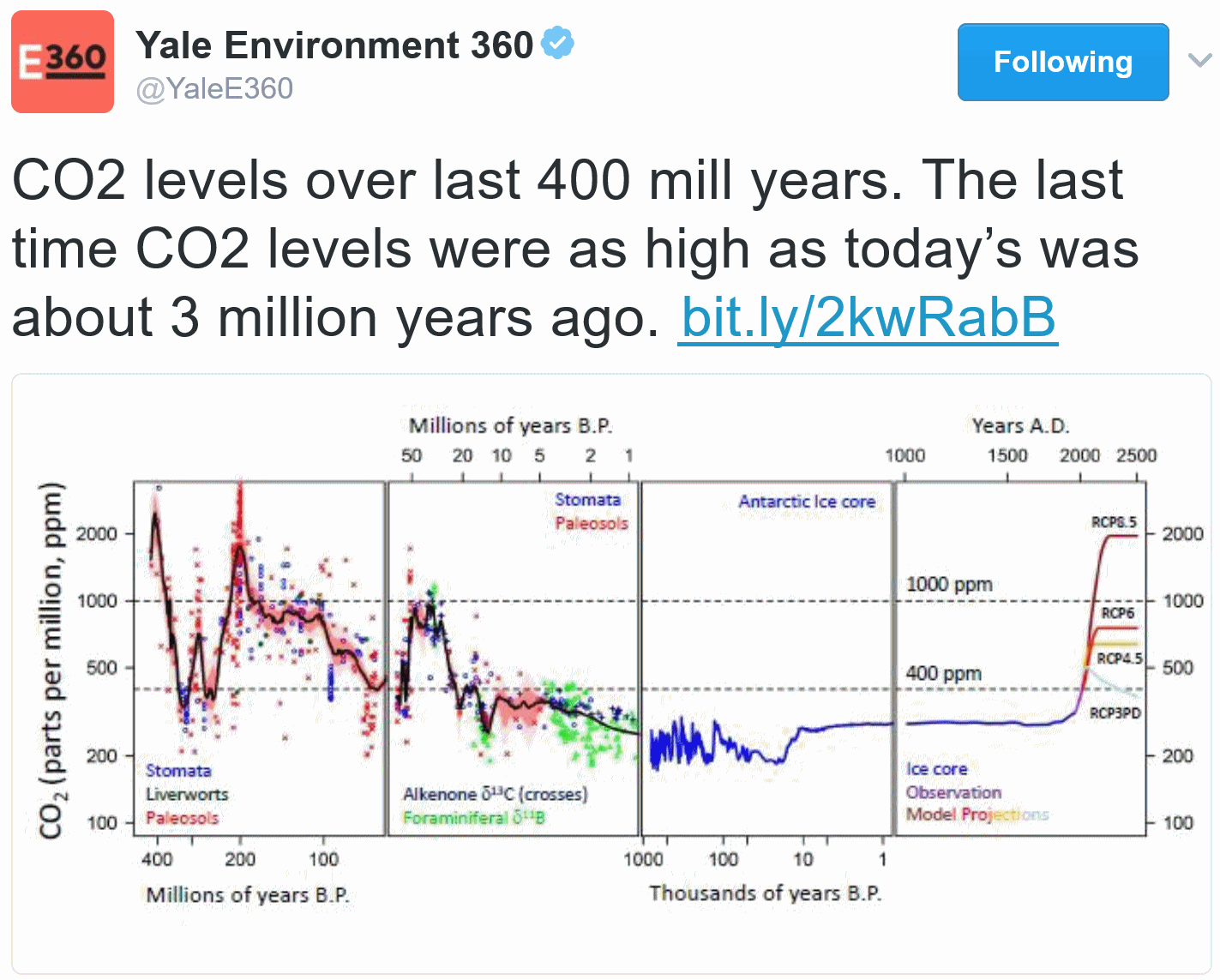 How the World Passed a Carbon Threshold and Why It Matters. Yale E360
How the World Passed a Carbon Threshold and Why It Matters. Yale E360 has the article; here's an excerpt: "...
The last time
the planet had a concentration of 300 to 400 ppm of CO2 in the
atmosphere was during the mid-Pliocene, 3 million years ago — recently
enough for the planet to be not radically different than it is today.
Back then, temperatures were 2 degrees C to 3 degrees C (3.6 to 5.4°F) above pre-industrial temperatures (though more than 10 degrees C hotter in the Arctic), and sea levels were at least 15-25 meters higher. Forest grew in the Canadian north and grasslands abounded worldwide; the Sahara
was probably covered in vegetation. Homo habilis (aka “handy man”), the
first species in the Homo line and probably the first stone-tool users,
got a taste of this climate as they arrived on the scene 2.8 million
years ago. (Homo sapiens didn’t show up until 400,000 years ago at the
earliest.)..."
An Independent Study Confirms NOAA's Conclusion that the Earth is Getting Warmer. Here's an excerpt from PRI,
Public Radio International: "
A
new analysis of sea surface temperatures from an independent source
corroborates updated global warming data released in 2015 by the
National Oceanic and Atmospheric Administration. The results contradict
allegations from some Republicans on Capitol Hill that NOAA manipulated
its 2015 data to show continuous global warming, since earlier NOAA
research had suggested the Earth was experiencing a warming "pause" or
hiatus. Between 1998 and 2012, NOAA research based on sea surface
temperatures seemed to suggest that average global temperatures were not
rising. This data did not support the theory of climate change, and
skeptics were quick to use these figures as proof that global warming
was a "hoax"...
Photo credit: "
An Argo float being
raised out of the Bellingshausen Sea is shown here. Argo floats are
robotic instruments that measure ocean data and transmit it to
satellites.
" Credit: fruchtzwerg's world/Flickr
Spotted in Washington: Conservatives Supporting Climate Action.
Christian Science Monitor has details: "...
Even
as climate change is essentially absent from the priority list of
President Trump and the Republican-led Congress, a meaningful number of
conservatives in America support the idea of reducing heat-trapping
gasses in the atmosphere. “You’re not going to convince 100 percent of
the world,” Aparna Mathur, an American Enterprise Institute economist
who was part of the panel, said after the event. But she sees a
shrinking number of conservatives who oppose a carbon policy. By some
measures, she may be right. In March 2016, a Gallup survey found
40 percent of Republicans saying they worry a “great deal” or “fair
amount” about the issue. That was up from 31 percent in a poll the
previous year. Even so, of course, support for climate action is hardly
an influential viewpoint in GOP politics..."
Photo credit: "
Not
that long ago, the Republican Party had a presidential nominee who
supported action to combat global warming. Above, candidate Sen. John
McCain of Arizona talks about the issue in 2008 in North Bend, Wash.,
(flanked by former Washington Gov. Dan Evans). Polls show that many
Republicans support climate action.
" Elaine Thompson/AP/File.
Fewer Days Below 32 F. Here's an excerpt from Climate Central: "Warmer
winters may sound great at first — fewer icy roads, less scraping your
car — but milder weather has some major downsides. Everything from
agriculture to wildlife to human health can be seriously impacted.
Warmer winters also pose serious economic consequences in many states
reliant on revenue from winter sports and recreation. The number of days
below 32°F in the U.S. has been declining. As the map above — adapted
from a 2016 Journal of Climate paper — demonstrates, this trend is
projected to continue, threatening many of the winter activities that
rely on cold conditions, including skiing, snowmobiling, ice fishing,
and outdoor ice hockey..."
Bob Inglis: Unmasking the Deceit Over Climate Change.
Former U.S. Congressman Bob Inglis from South Carolina is a friend and a
fellow conservationist and Republican who acknowledges that climate
change is real - and we have a moral obligation to act, empowering
markets - trying to reach bipartisan consensus on economy-empowering
solutions that generate jobs and growth, while turning down the dial on
carbon pollution. Here's an excerpt of an Op-Ed he wrote for
The Greenville Journal: "...
We believe in the power of markets. We believe in accountable free enterprise. We
believe that firms should compete in transparent marketplaces where all
costs (including external, “social” costs) are attached to all products
and all subsidies are removed. We believe that
the government should function as the honest cop-on-the beat who makes
domestic and foreign firms alike bear all of the costs created by the
sale of their products in the American market. We believe in the power of price signals like the ones Milton Friedman taught. We
believe in the liberty of enlightened self-interest and in the
innovation that can come from a world of consumers seeking clean energy. We don’t believe in the growth of government..."
Photo credit: windonthewires.com.
Climate and Security: Steering the Ship of State Through Uncertain Waters. Here's an excerpt from the
Center for Climate & Security: "...
These
are trends that will likely continue, regardless of shifting political
dynamics. These are issues that political leaders will seek to shape and
manage, but will not be able to eliminate. Indeed, climate change is
happening without concern for who is in power. Just as it’s impossible
to dispute the existence of nuclear weapons, and the threat nuclear
proliferation poses to all nations, the reality of a rapidly-changing
climate is here to stay. The Arctic is melting, the seas are rising, and
wildfires and droughts are becoming more severe. This is the existing
global reality. If tomorrow’s leaders don’t recognize and deal with this
underlying trend– distracted as they are by the turbulence of daily
events – we are likely to miss critical threats to national, regional
and international security..."



No comments:
Post a Comment